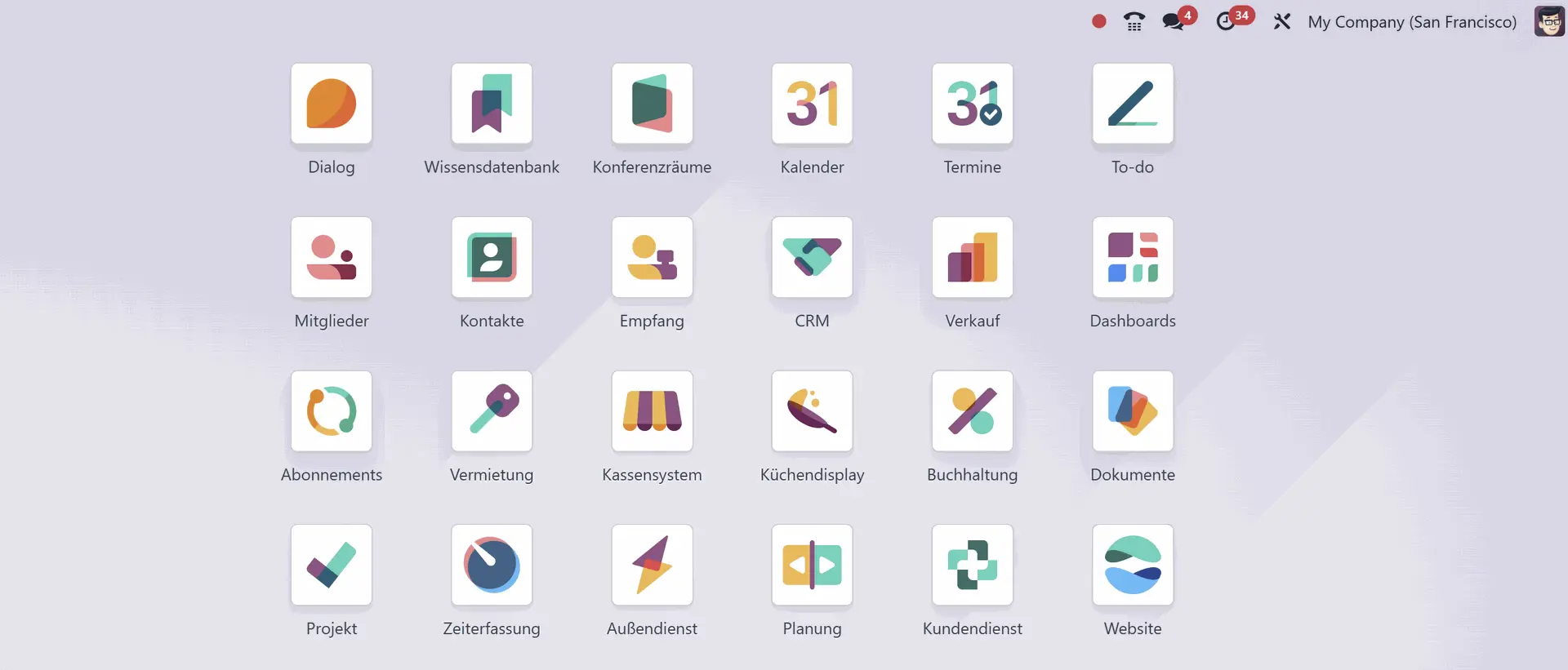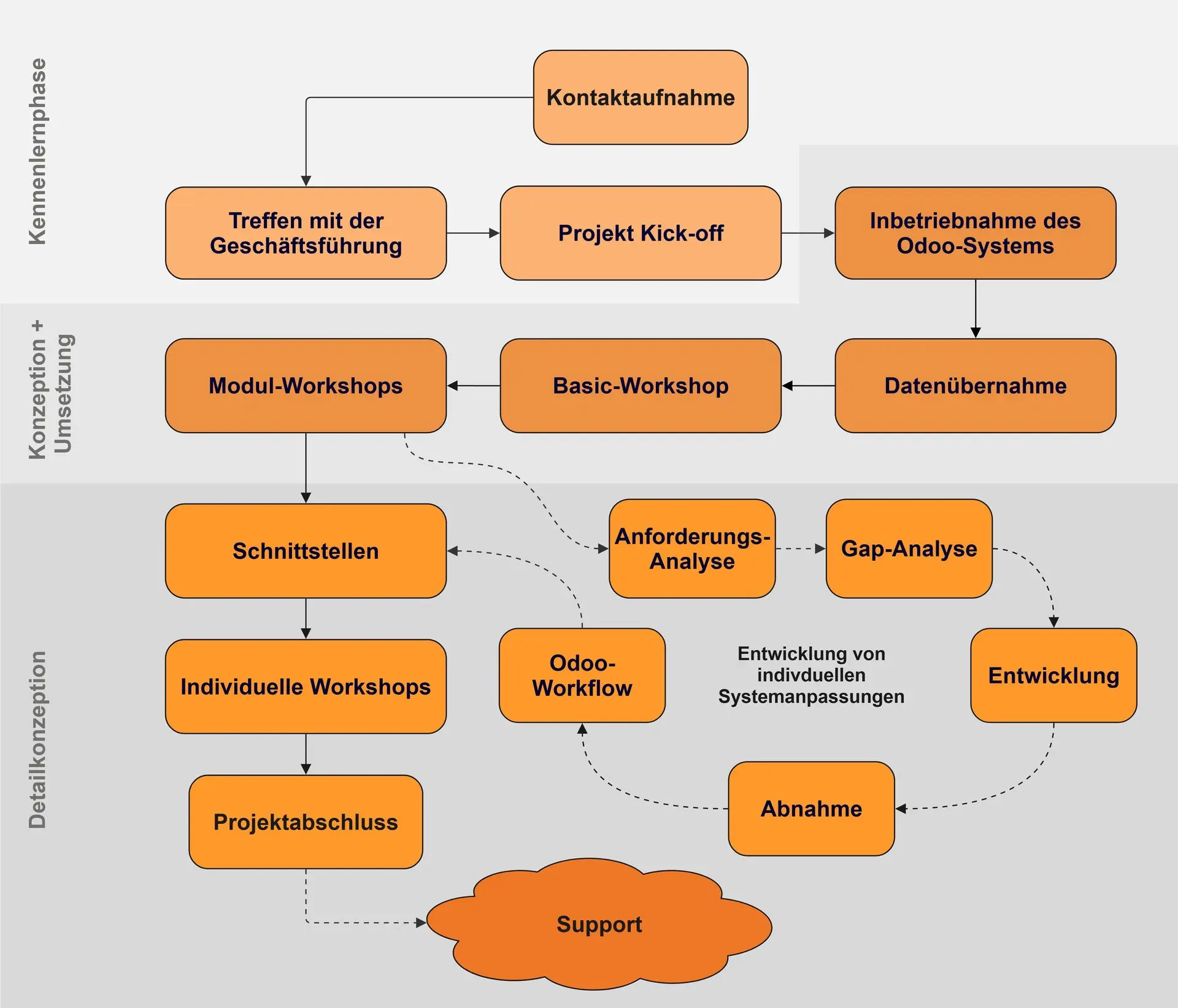Mit zunehmender Digitalisierung in allen Lebensbereichen befassen sich immer mehr Unternehmen mit der digitalen Abbildung ihrer Geschäftsprozesse. Genau das ist mit ERP-Systemen möglich, welche sich auf die individuellen Prozesse aller Betriebsbereiche anpassen lassen, um diese aus einem zentralen Programm heraus zu verwalten und auszuwerten.
Was unterscheidet Odoo zu anderen ERP-Systemen?
Das ERP-System Odoo zeichnet sich durch einen modularen Aufbau aus, welcher alle Prozesse vom Einkauf über die Lagerverwaltung bis hin zum Kundenmanagement und einem Webshop abdeckt. Mit einer modernen, an Smartphones angelehnten, Benutzeroberfläche können diese und viele weitere Bereiche immer im Blick behalten werden. Da das System Open Source ist, können alle Module an Ihre individuellen Anforderungen angepasst werden. So überrascht es uns nicht, dass Odoo mittlerweile eine der beliebtesten ERP-Lösungen für kleine und mittelständische Unternehmen darstellt.

Die Gründe für die Nutzung von Odoo sind durch die zentrale Übersicht und einer gemeinsamen Datenlage vielseitig. Hierzu zählen unter anderem eine erleichterte Problemerkennung und Prozessoptimierung, aber auch die bereichsübergreifende Zusammenarbeit der Mitarbeiter und der Kostenvorteil im Vergleich zu mehreren parallel genutzten Plattformen.
Wie verläuft die Einführung und Nutzung des Systems?
Die Systemeinführung und Nutzung von Odoo verläuft in der Regel in vier aufeinander folgenden Phasen. Nachdem auf Basis der initialen Geschäftsvision und der Vorteile von Odoo die Auswahl des Systems steht, ist der nächste Schritt die Einbringung dieses in das Unternehmen.

Damit Odoo dir den bestmöglichen Mehrwert bieten kann, gilt es, das System während der sogenannten Implementationsphase technisch auf die Besonderheiten in den abzubildenden Unternehmensbereichen anzupassen. Hierzu zählen unter anderem die Einrichtung benötigter Routen im Lager, der Produktimport oder auch die Konfiguration von Schnittstellen für Drittsysteme. Mindestens genauso relevant wie die technische Systemanpassung ist die Schulung der Mitarbeiter bereits während der Implementationsphase. Nur mit ausreichender Nutzererfahrung bereits vor der finalen Systemeinführung in das Unternehmen kann ein möglichst reibungsloser und effizienter Übergang hin zur täglichen Arbeit mit Odoo sichergestellt werden.
Vor dem Hintergrund der vielseitigen Anwendungsfälle und den hohen Nutzungsanforderungen, erfolgt die Implementierung des Odoo-Systems zumeist innerhalb eines umfangreichen Projekts. Dabei ist es vor allem in kleinen und mittelständischen Unternehmen üblich für die Konfiguration des Systems und die Einarbeitung der Mitarbeiter mit einem darauf spezialisierten externen IT-Dienstleister als Projektpartner zu kooperieren, da die dafür benötigten Ressourcen oft nicht von Haus aus zur Verfügung stehen. Auch nach einer erfolgreichen Implementierung sind in der Regel weitere Maßnahmen notwendig, da im Laufe der Zeit beispielsweise sich verändernde Geschäftsprozesse im Odoo-System abgebildet werden müssen. Auch eine Ausweitung der Funktionen, Systemupdates oder anderweitige Verbesserungen sind Gründe für eine weiterführende Zusammenarbeit.
Warum ist Change-Management bei der Systemeinführung so wichtig?
Dem Begriff Change-Management wird auf Grund der sich immer schneller verändernden Unternehmensumwelt zunehmend mehr Bedeutung zugeschrieben. Unter diesem Begriff werden demnach Veränderungen auf strategischer und operationeller Ebene konzipiert und umgesetzt, wobei in allen beteiligten Aspekten des Wandels eingegriffen wird, um die angestrebte Veränderung nachhaltig und effektiv zugleich durchzuführen. Bei einem Odoo-Implementierungsprojekt handelt es sich ebenfalls um eine meist unternehmensweite Veränderung, da in der Regel ein Großteil der Mitarbeiter das ERP-System täglich bei der Arbeit benutzt. Ebenso können einzelne Geschäftsprozesse durch die alleinige Implementierung von Odoo bereits verbessert werden, was ebenfalls zu Veränderungen des späteren Workflows führen kann.
Die erfolgreiche Implementierung eines neuen Systems in einem Unternehmen erfordert vor dem Hintergrund also nicht nur die technische Umsetzung, sondern vor allem auch eine gezielte Heranführung aller Stakeholder an die Veränderung und eine strukturierte Einarbeitung der betroffenen Mitarbeiter. Der menschliche Faktor und die korrekte Auseinandersetzung mit Veränderungen stellen in dieser Art von Projekten daher einen zentralen Erfolgsfaktor dar.
Bei der Projektplanung sollten bereits vor dem eigentlichen Projektstart die Rollen und Verantwortlichkeiten der beteiligten Akteure klar definiert werden. Eine detaillierte Projekt- und Zeitplanung ist ein wichtiger Faktor für den Erfolg des Projekts, und es ist ratsam, den Plan kontinuierlich zu überprüfen und bei Bedarf anzupassen. Im gesamten Projektverlauf ist eine effektive Kommunikation entscheidend, um das Projekt transparent zu gestalten. Alle beteiligten Parteien sollten die Hintergründe, Risiken und Vorteile der geplanten Veränderung offen und direkt kommunizieren. Um dies zu garantieren, empfiehlt es sich, alle genutzten Kommunikationskanäle, wie beispielsweise persönliche Treffen, Meetings oder Telefonate, im Laufe des Projekts auf ihre Effizienz zu überprüfen und bei Bedarf neue Kanäle einzuführen. Es ist auch wichtig, eine Change-Management-Strategie zu entwickeln, um sicherzustellen, dass alle betroffenen Mitarbeiter die Veränderung akzeptieren und mit dem neuen System erfolgreich arbeiten können. Dabei können vorherige Veränderungsprojekte als Indikatoren für die Akzeptanz genutzt werden.
Die Methodik der Einführung spielt eine entscheidende Rolle bei der erfolgreichen Integration eines ERP-Systems, um die Mitarbeiter mit dem neuen System vertraut zu machen. Es ist empfehlenswert, die Teilnehmerzahl in den Workshops gering zu halten und die erworbenen Kenntnisse an relevante Key-User weiterzugeben, die sie dann im Unternehmen verbreiten können.
Grundlegende Veränderungen, wie eine solche Systemimplementierung innerhalb eines Unternehmens, sind oft mit Unsicherheit verbunden. Viele Mitarbeiter akzeptieren Veränderungen eher, wenn sie die Probleme der aktuellen Situation verstehen und die Vorteile des zukünftigen Zustands erkennen können. Aus diesem Grund ist es essentiell, dass der IT-Dienstleister während des gesamten Prozesses präsent ist und auch mit skeptischen Mitarbeitern umgehen kann.
Wie werden Implementierungsprojekte bei der manaTec durchgeführt?
Bei der manaTec steht die Relevanz des Change-Managements in allen Projektphasen im Fokus - ganz gleich ob die Beratung oder die technische Systemanpassung die Oberhand hat. Selbst in Kombination beider Schwerpunkte streben wir immer nach vollständiger Transparenz und einer aktiven Mitgestaltung unserer Kunden, um ihre individuellen Anforderungen bestmöglich umzusetzen. Nur auf diese Weise kann das Ziel einer erfolgreichen und termingerechten Live-Schaltung des Systems gemeinsam erreicht werden. Als technische Experten agieren wir nicht nur als Dienstleister, sondern navigieren dich aktiv durch das Projektgeschehen. Typischerweise führen wir unsere Implementationsprojekte in drei Phasen bestehend aus einer Kennenlernphase und zwei aufeinanderfolgenden Umsetzungsphasen durch. Die folgende Infografik fasst die Einzelheiten der Phasen übersichtlich zusammen.

In unseren Nutzerworkshops zu allen von dir benötigten Modulen können die jeweils betroffenen Mitarbeiter bereits vor der finalen Implementierung das System spielerisch und aktiv kennenlernen. Für einen nachhaltigen Lerneffekt nehmen wir grundsätzlich alle Workshops auf und stellen sie dir im Anschluss zur freien Verfügung.
Nach Abschluss des erfolgreichen Projekts stehst du mit deinem neuen Odoo-System allerdings keineswegs allein da. Wir bieten dir selbstverständlich unseren umfassenden Support auch über das Implementierungsprojekt hinaus an, um alle aufkommenden Fragen zu klären und dich bestmöglich in allen Belangen zu unterstützen. Dein Erfolg ist unser Erfolg und wir sind stets für dich da, um dir bei jeder Herausforderung zur Seite zu stehen.
Du bist auf der Suche nach einem ERP-System, mit dem du neben deinen Geschäftsprozessen auch deine vollständige Unternehmenskommunikation abbilden kannst oder bist bereits von Odoo so überzeugt wie wir? Kontaktiere uns jetzt und wir stehen dir als erfahrener Odoo-Partner bei allen Fragen rund um die Implementierung zur Seite!
Quellen: odoo.de, ifm-business.de, business-wissen.de
Change-Management in der Odoo Implementation